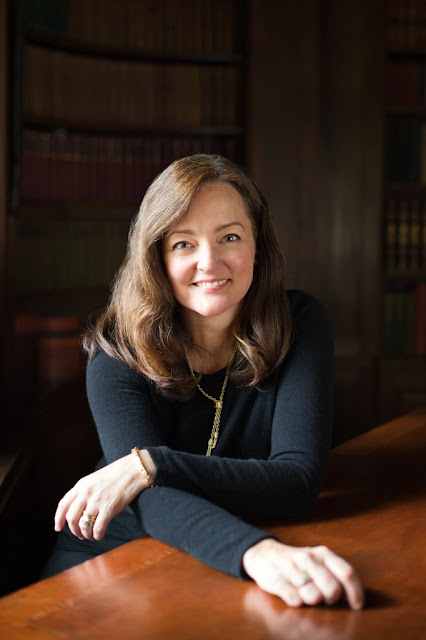Sabine Durrant
Sabine Durrant is a former assistant editor of The Guardian and a former literary editor of the Sunday Times whose feature writing has appeared in numerous British national newspapers and magazines. She has been a magazine profile  writer for the Sunday Telegraph and a contributor to The Guardian’s family section. She is the author of several books, including Under Your Skin, Lie With Me, and Finders, Keepers. She lives in south London with her husband, the writer Giles Smith, and their three children.
writer for the Sunday Telegraph and a contributor to The Guardian’s family section. She is the author of several books, including Under Your Skin, Lie With Me, and Finders, Keepers. She lives in south London with her husband, the writer Giles Smith, and their three children.
Durrant applied the Page 69 Test to her newest novel, Sun Damage, and reported the following:
How much work does your title do to take readers into the story?Visit Sabine Durrant's Twitter perch and Instagram page.
With every novel, I have a working title which I think is brilliant and in every case my publisher disagrees wildly and we play title ping-pong for several weeks until we finally come up with something that everyone’s happy with. My working title for Sun Damage was Lulu. The main character in the book is a con artist, who takes on personas and plays with identity, and I liked having a title that dealt with that head on (’Lulu’ isn’t her real name). But Sun Damage, which is what it ended up as, is a much better title. It tells you more. It gives you an atmosphere. Lulu could be a romantic comedy, or social realism or a pop star’s biography. Sun Damage could only be a thriller. It immediately sets up a tension between expectation and reality, between vacations in a sunny clime (the south of France) and characters with deep flaws and things going horribly wrong.
What's in a name?
Names are important in Sun Damage because my main character and her accomplice use several aliases. One of the first rules of the con is to choose a name that is bland and easily forgettable, and also one that isn’t too dissimilar to your own so you will react if called. Sean goes by John and Ali goes by Ellie. They are names that blend into the background, and being in the background, chameleon-like, is how my characters make their living. The challenge for Ali in the plot of the book is being forced by events to play the part of somebody whose name draws attention to itself, rings out like a bell: Lulu. The name is representative of the danger she puts herself in.
Do you find it harder to write beginnings or endings? Which do you change more?
I often have the idea for the beginning of a novel before I have the full plot so the beginning often comes very easily. Before I started writing Sun Damage, I had the image of a young woman in my head, and a beach bar setting, and the notion of a con going badly wrong and of the woman seizing the opportunity to escape from her partner. I knew what the rough arc of the book would be, the adventure of it, and how it would end – but when I got there, the twist didn’t seem strong enough. Ali as a character had developed more layers and more depth – she had more back story, more ‘damage’ of her own - her narrative needed a more complicated resolution than the one I had initially intended. This happens every time. I love beginnings; endings are so much harder.
Do you see much of yourself in your characters? Do they have any connection to your personality, or are they a world apart?
When I first started writing, I used to think, ‘what would I do?’ in the situations I put my characters in. ‘What would I think? What would I feel?’ It was anunhelpful instinct. It’s better to treat it like acting. You put on the coat of your character and you walk and talk like them, and you notice things, and respond as they would. In that sense, I never think about my own personality – which is probably a good thing, as quite often I seem to have found myself writing in the voice of a sociopath. With subsidiary characters, on the other hand, I do sometimes slip myself in. It’s a bit like a form of penance; some of the worst social faux pas or comments are things I may have lain awake at night regretting. At least in fiction I can laugh at them!
What non-literary inspirations have influenced your writing?
Sun Damage was definitely influenced by depictions of the con artist in film and television. I’ve watched a lot of Hustle, a long running BBC drama starring Adrian Lester as the boss of a team of London grifters. It’s brilliant on the nitty gritty of the con artist. Films such as David Mamet’s House of Cards and Stephen Frears’ The Grifters (based on Jim Thompson’s novel) were also highly influential – the relationship between grifters is so rich and complicated; friends and lovers, family even: who can be trusted? There’s a sequence in Ocean’s 11, when Julia Roberts cuts a swathe through the department store Bergdorf Goodman, using charm and spin to dupe her way to free beauty products, which is just deeply satisfying and amusing to watch. The joy of the con as a narrative device is that the intellectual satisfaction of it forces the viewer to suspend moral judgment. That’s gold in a psychological thriller.
The Page 69 Test: Sun Damage.
--Marshal Zeringue


























